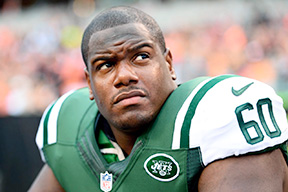Jordan Spieth’s back nine collapse last Sunday at the Masters is being called the most shocking collapse in golf history by many. I am a fan of the young superstar in the sport and I am still finding it hard to believe what I saw on Sunday. For myself and golf fans all over, it was painful to watch.
Spieth lost a five-shot lead on the back nine of the final round of The Masters, and it included a quadruple bogey seven that featured two balls in the water at the Par 3 12th hole. After a birdie at the ninth hole gave Spieth a five-shot lead, he found himself trailing by four strokes less than an hour later, and eventually went on to lose the tournament to Danny Willett.
Collapses happen in the sport. But not to this guy. Last year, Spieth took the golfing world by storm at 22 years of age. He made the game look so easy.
Jordan Spieth on April 10
Spieth ended up winning five times on tour including two majors, capturing the FedEx cup, and banking more than $31 million in his young PGA career. It was an unreal streak where he showed the world just how talented he is and what he is capable of. He won the hearts of golfers and non-golfers everywhere.
The way he carries himself makes most golf fans like him. So, like most people watching the final round of The Masters, I was pulling for Spieth. I wanted to see him win back-to-back green jackets. I have always admired greatness and enjoy viewing historical sporting milestones that take place in my lifetime. It was hard not to feel bad for Spieth.
I think two things will transpire after what happened on Sunday. I think more fans will gravitate to Spieth and I think the experience will make him an even more dominant force on the PGA Tour. I believe this painful loss will make him even more mentally tough and a better player in the future. It has been awhile since Spieth has faced any sort of adversity on the golf course. It came so easy to him last year.
Spieth’s collapse at the Masters on Sunday afternoon will make him even stronger because champions know how to comeback from reclaim their prowess. And I believe Spieth is a champion. Most champions in the world of sports fail again and again but come back even better. Until now, Spieth did not truly understand the agony of defeat. He does now. And I believe he will be better for it.
Concussion Crisis In NFL
It is happening more and more. The NFL’s concussion crisis is leading to a logical repercussion. The retirement crisis. More and more, young players are walking away from the game and their large contracts.
Last Friday, New York Jet s offensive tackle and former Pro Bowler D’Brickashaw Ferguson announced his decision to retire from the NFL at 32 years old. Usually players, especially these days with multi-million dollar contracts, play until their talent fades.
s offensive tackle and former Pro Bowler D’Brickashaw Ferguson announced his decision to retire from the NFL at 32 years old. Usually players, especially these days with multi-million dollar contracts, play until their talent fades.
D’Brickashaw Ferguson
Ferguson, like around a dozen other NFL players over the past year or so, has retired early without any outstanding injury or body-related issues. In other words, he is trying to keep his health. Ferguson was Mr. Durability. He played 10 seasons and never missed a single practice or game or snap. Ferguson started 167 consecutive games with over 10,000 career snaps, Without question, Ferguson could’ve kept on playing the game he obviously loves for millions of guaranteed dollars. But he did not want to risk it.
Early retirements from the NFL are not stunning anymore. Now that we have concussion stats, players are more aware of the risks. Eighty-seven out of 91 former NFL players tested positive in September 2015 for the degenerative brain disease chronic traumatic encephalopathy (CTE), which is believed to stem from repeated hits to the head. Players gain the knowledge and are making use of it. They are starting to choose their long-term health over their relatively short-lived playing careers.
San Francisco 49er Chris Borland retired at 24 years old in March 2015, saying that he didn’t want to have “any neurological diseases or die younger.”
Chris Borland retired last year
Buffalo Bills linebacker A.J. Tarpley retired at 23 years old on Wednesday, citing concussions and a desire to “preserve my future health” as his reason. Safety Husain Abdullah, 30, retired last month because he wanted a “sound mind” in the next stage of his life. Below the NFL level, 26 college football players have retired over the past three seasons because of concussions, according to Al Jazeera America.
These guys are choosing to control their fate over football. Over the past two offseasons, NFL players, including elite ones like Calvin Johnson, Marshawn Lynch and Patrick Willis, in addition to Anthony Davis, Jerod Mayo, Jason Worilds, Jake Locker and B.J. Raji, all aged 30 or below when they announced, have retired earlier than anyone would expect. These guys are stars who stood to make many more millions of dollars.
It is truly a new crisis within the game. Players who traditionally would determine retirement based on whether the market would still want them or not, are starting to seek healthful living and a peace of mind being out of the game and the risks within the game.






